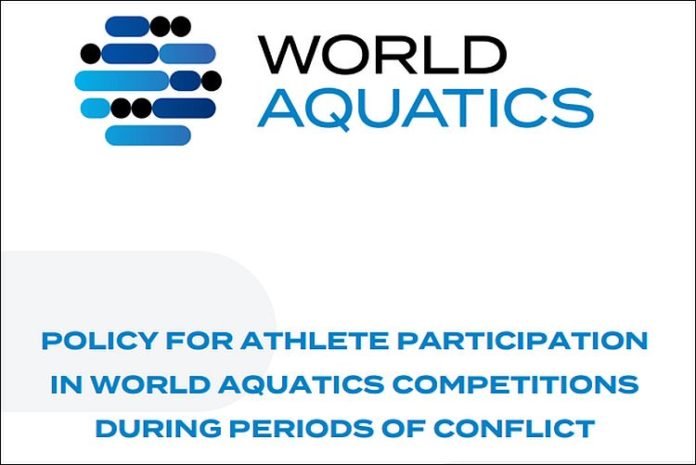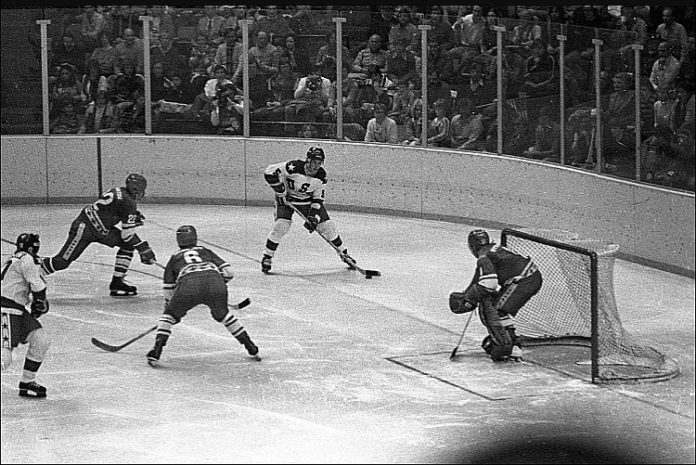★ The Sports Examiner: Chronicling the key competitive, economic and political forces shaping elite sport and the Olympic Movement.★
★ To get the daily Sports Examiner Recap by e-mail: sign up here! ★
≡ SPOTLIGHT ≡
SwimSwam.com reported on a revised policy being considered by World Aquatics for athletes from countries “during periods of conflict.”
World Aquatics followed the lead of the International Olympic Committee in prohibiting Russian and Belarusian entries in events after the Russian invasion of Ukraine in February 2022 as “protective measures” for the sport and athletes concerned. Ultimately, there was one Russian swimmer and three Belarusian swimmers at the Paris 2024 Olympic Games.
The new policy would be administered by the World Aquatics Bureau, “with the objectives of ensuring the integrity and security of sporting competitions and the overall respect for Athletes, World Aquatics and Olympic principles and values.” It also applies to event organizers.
Athletes from any member federations which is in a “nation in Conflict” would be subject to the policy. The question of which countries from “in Conflict” would be up to the eight-member World Aquatics Executive, a subset of the 40-member Bureau.
Participation would be allowed for athletes from in-conflict nations based on four qualifications:
● “2.1.1 Compliance with all World Aquatics Regulations;
● “2.1.2 No direct contractual relationship with any national security agencies or military associated with any government of a nation in Conflict;
● “2.1.3 No support for any Conflicts, including any form of verbal, non-verbal or written expression, explicit or implicit, for any types of political conflicts or war, in particular public statements, including those made in social media, participation in pro-conflict or pro-war demonstrations or events, and the wearing of any symbol in support for any types of political conflicts or war; and
● “2.1.4 Compliance with the Anti-Doping requirements set out below in Annex 1.”
This applies to swimming, diving, high diving and artistic swimming, but not water polo, considered a contact sport and therefore not eligible for participation for “nations in Conflict” athletes.
The review of athlete status from federations in “nations in Conflict” will be made by the Aquatics Integrity Unit (AQIU), upon application by athletes, coaches and other support staff.
If approved, the athlete would be considered a “neutral,” as was the case at Paris 2024 for Russia and Belarus, and would compete without uniform identification of insignia, flags or anthems at competitions. Athletes would be identified as “NA” and not with a national abbreviation.
A decision on “neutrality” by the AQIU is reviewable by appeal to the Court of Arbitration for Sport within 21 days.
Government or state officials from “nations in Conflict” will not be invited to or accredited for World Aquatics events. However, the policy does not require – or even mention – any suspension of the member federation in a “nation in Conflict.”
It appears that the World Aquatics Bureau has the authority to approve and implement this policy, without a vote of a World Aquatics Congress.
Observed: There are obvious parallels to the International Olympic Committee’s process for creating the Individual Neutral Athlete process for Paris 2024. However, the approach taken in this new document by World Aquatics raises significant questions for the near term.
The Russian invasion of Ukraine is continuing without any indication of ending and will mark a sad third anniversary in February. At the same time, the Hamas invasion of Israel on 7 October 2023 sparked a strong response from Israel into Gaza – under Hamas rule – and now into Lebanon to fight Hezbollah, which like Hamas, is allied with Iran. Iran has struck Israel with missiles and Israel is expected to strike back, in its own way and time. The Houthi rebels in Yemen, also allied with Iran, have fired missiles into Israel as well.
It is not difficult to see that much of the Middle East could be “in conflict” within weeks if not months, and if the war there spreads, will larger actors also enter? How would the eight-member World Aquatics Executive deal with that?
These questions have to cloud the issue of any policy which deals with athletes from countries which are in a shooting war with others. It’s worth remembering that the IOC’s action against Russia and its ally Belarus in February 2022 came as a result of Russia’s violation of the Olympic Truce period. That’s not the trigger for World Aquatics in its new policy, simply a finding of the World Aquatics Executive that a nation is “in Conflict,” which is not defined.
A mess? Yes, the world today is a mess. World Aquatics appears to be trying to do the right thing by introducing a defined policy to deal with issues that go far beyond sport. But perhaps, for now, at the wrong time.
¶
★ Receive our exclusive, weekday TSX Recap by e-mail by clicking here.
★ Sign up a friend to receive the TSX Recap by clicking here.
★ Please consider a donation here to keep this site going.
For our updated, 547-event International Sports Calendar for the rest of 2024 and beyond, by date and by sport, click here!























